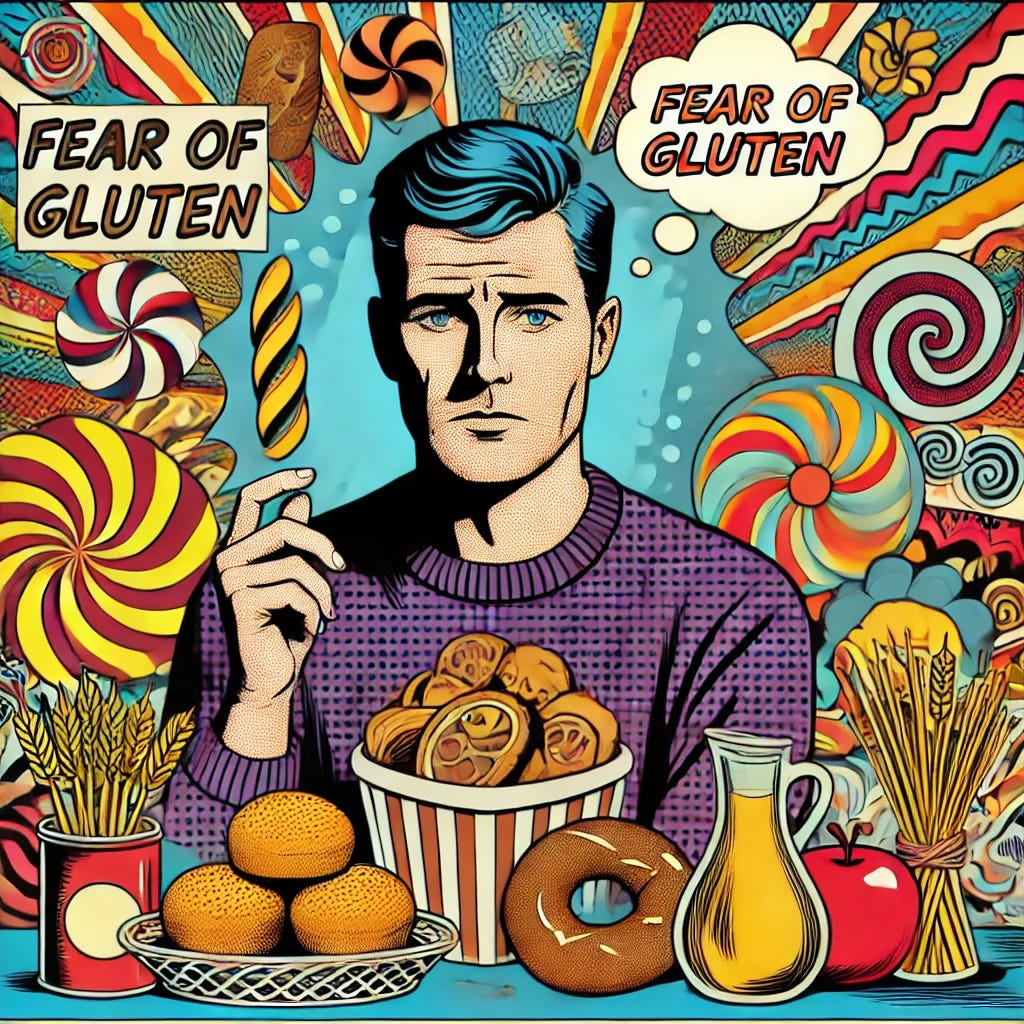I’ve often convinced myself that gluten is the root of my health issues. Ever since I did an intolerance test that showed two reactions to gluten proteins out of a possible twelve markers, I've developed what I can only describe as a fear of gluten. This fear wasn't always there; it crept in gradually, a shadow that grew after that test, overshadowing rational thought.
Seeking answers, I went for a celiac test with my GP, hoping, in a strangely distorted way, that it would come back positive. I thought that finally I'd have a clear answer to what’s wrong with me and could craft a detailed plan to fix it. But when the results were negative, I told myself, “it’s just gluten sensitivity." It felt like a consolation prize—not quite celiac, but something to work with. From then on, I decided to eliminate gluten from my diet entirely. That was in 2014, back when I was new to the nutrition world, naively taking everything at face value without much questioning of my thoughts or processes.
In the industry I work in, gluten is frequently viewed with caution, and its removal is commonly recommended as a general approach for many gut health concerns—and even for various chronic health conditions. For some, it works wonders, but what's rarely considered is the psychological impact of telling someone that gluten is bad for them or the full scope of what gut healing truly entails. The body isn't just a machine that responds to dietary changes in isolation; it's a complex interplay of mind and body.
I can cut gluten out for weeks and feel the benefits—I feel lighter, less bloated, and even more energised, but the reality is that my diet then becomes lower in grains and higher in vegetables. I end up putting more thought into my meals rather than just grabbing a sandwich on the go. I start buying gluten-free products, which often have an eerie longevity, sometimes looking fresher after three weeks than when I bought them. But they often lack the fibre of their wheat-based counterparts, and there’s always a nagging feeling that something is missing.
When I go to the supermarket, I scrutinise every label, meticulously checking for any trace of gluten. I think I’m doing wonders for my health, but then I walk past a bakery and catch a whiff of freshly baked bread. I reason with myself that a little gluten won’t hurt—after all, it's high quality, and I'll savour every bite. Of course, I devour it within seconds, and then guilt rushes in. That’s it, I think; my immune system is going to hate me forever for that.
But nothing happens, and I start to think maybe I can have a bit more gluten. I gradually add it back into my diet, feeling more at ease when dining out and even getting a small thrill from telling waiters I have no allergies while reasoning with my ego again. But then the bloating and wind begin, and I panic—ahh, it's the gluten causing issues again! I need to cut it back. And so the cycle continues without considering that perhaps I’m eating more fibre or more convenience food without chewing properly.
When my gut is in disrepair, I turn to probiotics and tell myself that’s enough. I gauge the success of my diet by the state of my skin—if it's calm and free from psoriasis or eczema, I feel I'm on the right track. But when it flares, the guilt returns. I blame the croissant or rye bread I indulged in, rather than considering the stress I'm under, the way I push my body like a machine with exercise, or the chaotic state of my sleep. What I really need is to rest and de-stress—not just a bit of meditation here and there, but a true break from the busyness in my head. It's funny, though—when I adopt a "fuck-it" attitude and just eat what I like, my symptoms often disappear. But that's too easy, isn’t it? Or perhaps not—I just can't meticulously control this.
I’m not saying that gluten isn’t a factor in health issues, and, for some, it is an essential part of healing, but there's a complex interplay between emotions and the restriction of certain foods. The setbacks and feelings of failure are rarely considered when gluten removal is advised. Eliminating gluten is an easy control mechanism to improve someone’s health, but it’s far scarier to confront pain and trauma and be truly honest with yourself about what’s best for you. For me, it's about being honest with myself about why I'm running myself into the ground with stress and finding the courage to confront and change that truth.
If you found this post insightful or helpful, please give it a like! Thank you for reading and being a part of this journey.









Excellent post. I've been there with the gluten myself. Convinced I was borderline coeliac because of some obscure gene on my 23andme result, interpreted by some functional doctor in the US. The reality is that it has 0 negative effects on me, and that, in fact, I feel great when I eat whole grains like rye, spelt and barley, even whole wheat. But we were brainwashed to overanalyse. That was the business model... Anyway, I'm sure you're happier now, even with some skin issues popping up every now and then 💖